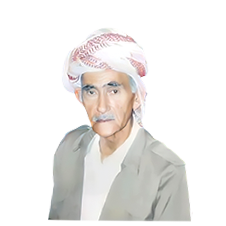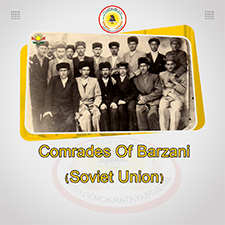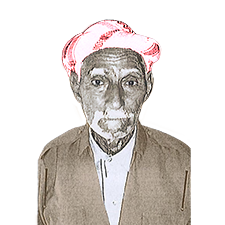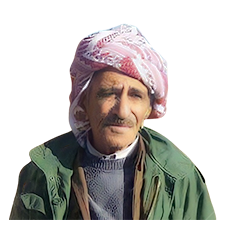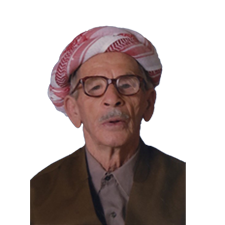Biography:
Hesso Mirkhan Dolamari was born in 1927 in the village of Khardan in the Mergasoor district of Erbil City's. He finished his education in the Soviet Union and graduated from Tashkent University with a bachelor's degree in highway engineering. In addition, he got married and had a daughter in the Soviet Union. After his return from the Soviet Union in 1959, he started working for the Kirkuk agriculture department before moving on to Betwata. Subsequently, He worked as land surveyor at the outset of the great revolution of Aylul in the shamkan region and atrush till near Bablo in Duhok City. In fact, he was fluent in speaking Kurdish, Persian, Turkish, and Russian.
:Service Record
After the war world II era, particularly in 1940 Shex Ahmad Barzani was moved from Nasrya to Sulaymaniyah with his entire family. Hesso Mirkhan was one of those who attempted to bring the Barzani family to Barzan, who had been imprisoned in Sulaymaniyah, back to the Barzan area. Accordingly, this was the main factor that he was wanted by the Iraqi government. He joined the Second Barzan Revolution in 1943, following the start of the Kurdistan Revolution.
He participated in several operations including the liberation of the Maidan Moriki police station on September 5, 1945, the liberation of the Kherzok police station on October 12, and the liberation of the Shanadar police station on October 2, 1945. For that reason, on August 19, 1945, the military customary court seized all of his possessions.
After the second Barzan revolution's defeat on January 11th, 1945, Mustafa Barzani and his companions went to the east of Kurdistan. After establishing the republic of Kurdistan in Mahabad on March 31, 1946, Hesso mirkhan defended the republic as part of the Barzani army and played an important role in Saghiz combat. After the Kurdistan Republic in Mahabad fell apart, Barzani returned from the east of Kurdistan to the south of Kurdistan. During that time, he participated in Naghada and Shno conflicts. In April19, 1947 he was one of the Peshmarga who returned to Sherwan and the Mizuri region through Khuakwrk and Barazgr area in the north of Kurdistan.
After their return on May 15, 1947, General Mustafa Barzani convenes a conference with his comrades in the village of Argush, and he gives them the option of remaining in Kurdistan or going to the Soviet Union. As a result, on April 23, 1947, he left for the Soviet Union alongside Mustafa Barzani. After that, he was engaged in the Gali Qtur and Prdi Mako fights. After a long and much difficulty, on June 18, 1947, on the Iranian-Soviet border, Mula Mustafa Barzani and his force crossed the Aras River.
Following their arrival in to Nakhchivan, Azerbaijan on June 19th, 1947, Mustafa Barzani and all of his companions were imprisoned for forty days. In fact, they were given the same treatment as prisoners of war in terms of food, clothing, and transportation while living in a camp which was surrounded by barbed wire and guarded by soldiers. Not long after, by decision of Soviet Union government, they were divided into groups and transferred to the regions of Aghdam, Lachin, Ayulakh and Kalbajar in the Republic of Azerbaijan. By December 10, 1947, they were moved to a military base on the Caspian Sea in Baku, the capital of the Republic of Azerbaijan. On the 23rd of the same month on the Caspian Sea in Baku, the capital of the Republic of Azerbaijan, Barzani's followers were organized into a military regiment and received training in military tactics and politics and taught to read and write Kurdish by their other educated Peshmarga.
As a result of Jafar Bakirov's mistreatment, On August 29, 1948, Mula Mustafa Barzani made the decision to relocate his military camp from Azerbaijan to the village of Chirchuk close to Tashkent, the capital of Uzbekistan, where they sustained their military training.
Following that, in March 1949, Mula Mustafa and his friends were split up into groups and sent by rail to the countryside of the Soviet Union, where they worked on the kolkhozes' crops. (Land that people rented from the government and then returned to it).
Finally after much effort and sending several letters by General Barzani to Stalin, Stalin finally received a letter in which Barzani talked about the suffering of his comrades. Stalin immediately decided to form a committee to investigate the situation of Barzani's comrades. When the committee investigated the situation of Barzani's comrades, they decided to gather them all in Vrievsky. As a result on November 1951, he went to Vrevsky, Soviet Union.
Once General Mustafa Barzani returns to Iraq after the revolution On July 14, 1958, he and his allies were got a general amnesty On February 25, 1959 in accordance with Articles 3 and 7, Paragraph (a) of Article 10, and Working with Article (11) based on the Amended Law No. 19.
After the amnesty was issued, he returned to Kurdistan on April 16, 1959 with his comrades on the ship Grozya through the port of Basra in the south of the Iraqi Republic.
Hesso Mirkhan Dolamari took part in the Eylul Revolution in 1961. On December 1961 He is the Zawita people's commander on the eastern front. On October 21 of the same year, Mullah Mustafa Barzani ordered the reorganization of the Peshmerga forces. On December 12, 1961, he participated in the Battle of Zawita People. Additionally, he took part in the battles of Bulbul Bridge, Lomana, Sulevan Plain, Garmava, Abdi Haji Agha, Sarsang, Pirs Mountain, Suwar, Spindar, Atrosh and Bekheri Mountains
He was in charge of the army in Sheikhan in 1962, and Bethel camp was under his command in the Sheikhan district. He took part in both the Battle of Brifka and the Battle of Marba in the same year. On March 23, 1962, he joined in the battle of Baadre. Moreover, on May 28, 1962, he participated in the Battle of Sar-e-Bardi. Likewise, he fought in the Battle of Sar-e-Akre on June 14–15, 1963. On October 4, 1964, for the perpose of reorganizing peshmarga force, He became commander of the forces in Akre and Sheikhan, which belonged to the First Badinan Army.
Subsequently, On October 7, 1966, he participated in the establishment congress of the Revolutionary Leadership Council in Gardaspian village in Sulaimani. On March 4, 1967, He was chosen by Mula Mustafa Barzani, to act as the Peshmerga forces' and the local population's representative in Mosul and its surrounds. With the March 11 agreement and the improvement of ties between the Revolutionary Leadership Council and the Iraqi government, on November 3, 1971, by order of Ahmad Hassan Bakri, the chairman of the Revolutionary Leadership Council, he was promoted to the rank of temporary police sergeant 9th Border Guard of Akre and Sheikhan.
In 1974, he returned to his previous job as commander of the forces in Akre and Sheikhan. A year later, after the collapse of the Eylul Revolution, he moved to Iran as a refugee and settled in Zeve community, then moved to Mashhad. By order of Mullah Mustafa Barzani, he moved to Karaj.
After Gulan Revolution in 1976 is revived from Eylul Revolution, He took part in the Gulan Revolution and led the forces as a commander. In 1978, when the earthquake struck the Iranian city of Tabas, he was the representative of Idris Barzani to visit the Kurdish refugees in the city.
On November 4, 1979, he attended the 9th Congress of the Kurdistan Democratic Party (KDP) and was elected to the position of commander of the first sector in Margawar and Targawar, which had its headquarters in Razhan. Furthermore, he was in charge of protecting the Political Secretariat.
In 1983, He took part in the Shahidan Valley combat and sustained injuries there. Likewise, he took part in the fight of Kandil that year and was wounded. On July 19, 1988, he contributed in the Dastan of Khawkurk, Zozk, Handren, and Sherwan Mazni. He took part in the Margawar, Kurdistan Democratic Party (KDP), and 10th Congress on December 2, 1989.
In 1991, he returned to South Kurdistan where he and Babakr Zebari were given the responsibility with leading the rebellion in the Badinan district. On August 16, 1993, He attended the Kurdistan Democratic Party's (KDP) 11th Congress, which took place in Erbil. On August 16, 1993, he participated in The 11th Congress of the Kurdistan Democratic Party (KDP) in Erbil. In 1993, He was selected to lead the High Social Committee of the Barzan area. During the Golden Jubilee celebration in 1996, President Massoud Barzani honored him with the Barzani Medal.
Sources:
-
حامید گهوههری، میدالیای بارزانی بهرزترین خهڵاتی ڕێزلێنان، بهرگی یهكهم، (ههولێر - چاپخانهی حاجی هاشم – ٢٠١٥)
-
حامید گهوههری، میدالیای بارزانی بهرزترین خهڵاتی ڕێزلێنان، بهرگی دووهم، (ههولێر - چاپخانهی حاجی هاشم – ٢٠١٥)
-
حیدر فاروق السامرائي، ضیاء جعفر و دوره السیاسي و الاقتصادي في العراق، (لندن – دارالحكمة - ٢٠١٦).
-
قرارات مجلس قیادة الثورة رقم ٧٣، مجلة الوثائق العراقیة، وزارة الاعلام في العراق، العدد ١٩٦٠ أ، بغداد، الاثنین، 1 شباط ١٩٧١.
-
له یادداشتی فهرماندهی شههید حهسۆ میرخان ژاژۆكی، ٦٢ ڕۆژ لهگهڵ بارزانی دا- چوونی بارزانییهكان بۆ یهكێتی سۆڤێت، چاپی یهكهم (ههولێر - چاپخانهی رۆشنبیری – ١٩٩٧)
-
مسعود بارزانی، بارزانی و بزوتنهوهی رزگاریخوازی كورد ١٩٣١ - ١٩٥٨، (دهۆك - چاپخانهی خهبات – ١٩٩٨)
-
مسعود بارزانی، بارزانی و بزوتنهوهی رزگاریخوازی كورد ١٩٦١ - ١٩٧٥، بهرگی سێیهم، بهشی یهكهم، (ههولێر - چاپخانهی وهزارهتی پهروهرده - ٢٠٠٤)
-
ئەرشیفی دەستەی ئینسکلۆپیدیا، دهقی چاوپێكهوتن لهگهڵ چنار حسۆ، پیرمام، ١٥ حوزیرانی ٢٠١٤.




